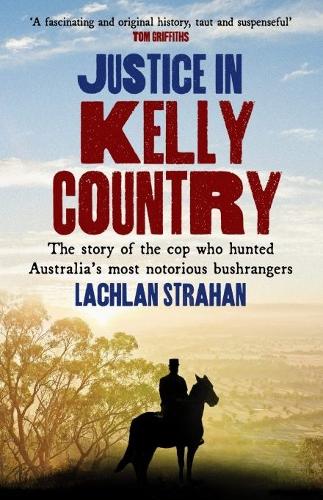
Justice in Kelly Country: The Story of the Cop Who Hunted Australias Most Notorious Bushrangers
(Paperback)
Available Formats
Publishing Details
Justice in Kelly Country: The Story of the Cop Who Hunted Australias Most Notorious Bushrangers
By (Author) Lachlan Strahan
Monash University Publishing
Monash University Publishing
1st October 2022
Australia
Classifications
General
Non Fiction
Biography: historical, political and military
363.209945
Physical Properties
Paperback
320
Width 153mm, Height 234mm
Description
Partway through the Jerilderie Letter, Ned Kelly accused Senior Constable Anthony Strahan of threatening to shoot him like a dog. Those few fateful words have ricocheted through Australian history. Many have blamed Anthony Strahan for the turmoil and bloodshed that unfolded during the Kelly Outbreak. For, two days after Anthony reputedly made his threat, Ned and his gang shot dead three policemen at Stringybark Creek. Neds reason for opening fire He thought one of the cops was Anthony.
Lachlan Strahan, Anthonys great-great-grandson, grew up believing Ned Kelly was a heroic outlaw and Anthony the ruthless cop who pursued him. Yet as he combed through letters, police reports, court transcripts, newspaper articles and family histories, Lachlan pieced together a different story about the life of his ancestor a fiery Irish immigrant who embodied the thin blue line in the bush for 32 years. Bent on justice, Anthony Strahan apprehended all manner of criminals, from brazen fraudsters and wily horse thieves to murderous husbands and the bushrangers who perpetrated the Wooragee Outrage. Yet his legacy was forever ensnared in the Kelly legend. Did Anthony utter those incendiary words about Ned Whose version of history do we believe
This is a tale about justice and retribution, morality and character, and making a life against the odds in a frontier society. It is also a story of inheritance: of the words passed from father to son, and the tales we choose to preserve and retell.
Reviews
A brilliant and original window into the Kelly outbreak of the hunter rather than just the hunted.
-- Janet McCalmanThis compelling and intimate history offers a new perspective on a national legend the infamous Kelly Gang and a vivid picture of the life of a policeman on the colonial Victorian frontier. Strahans career takes us constantly into the dark side of the colonial world, into the rough, vain and violent underside of a frontier society. Through the unfolding stories of individual cases and court dramas, we examine Constable Strahans character in action and it is character that goes to the heart of the books defining scene, the conversation near Greta during the Kelly Outbreak. The story moves towards and away from that pivotal moment, showing how it framed a life and, perhaps, precipitated a tragedy. The book is also a beautiful meditation on history and memory and the power of family storytelling. This is a fascinating and original history, taut and suspenseful, written with subtlety and flair.
-- Tom GriffithsIn this story of his ancestor, Senior Constable Anthony Strahan, Lachlan Strahan brings to life a lost world of rural Victoria in the era of gold-seeking, free selection and bushranging. The book climaxes in the pursuit of the Kelly Gang, the moment when Anthony steps briefly into national history, but this is above all the story of an Irish migrant who makes his way in colonial Victoria by pursuing the hard life of a country policeman. It is also a family history: in tracing the life and times of Anthony, Lachlan is also learning something more about his own father, Frank, an archivist, historian and radical who admired the rebel and folk hero Ned Kelly and despised a man of the law, his own relative, who had helped bring a killer to justice.
-- Frank BongiornoThis is a fascinating and original history, taut and suspenseful, written with subtlety and flair.
-- Tom GriffithsLachlan Strahan brings to life a lost world of rural Victoria in the era of gold-seeking, free selection and bushranging.
-- Frank BongiornoAuthor Bio
Lachlan Strahan is a historian and a diplomat. His first book, Australias China, has become one of the standard works on AustraliaChina relations. His second, Day of Reckoning, traced a series of crimes in Papua New Guinea after World War II and was shortlisted for the 2006 NSW Premiers Australian History Prize.
